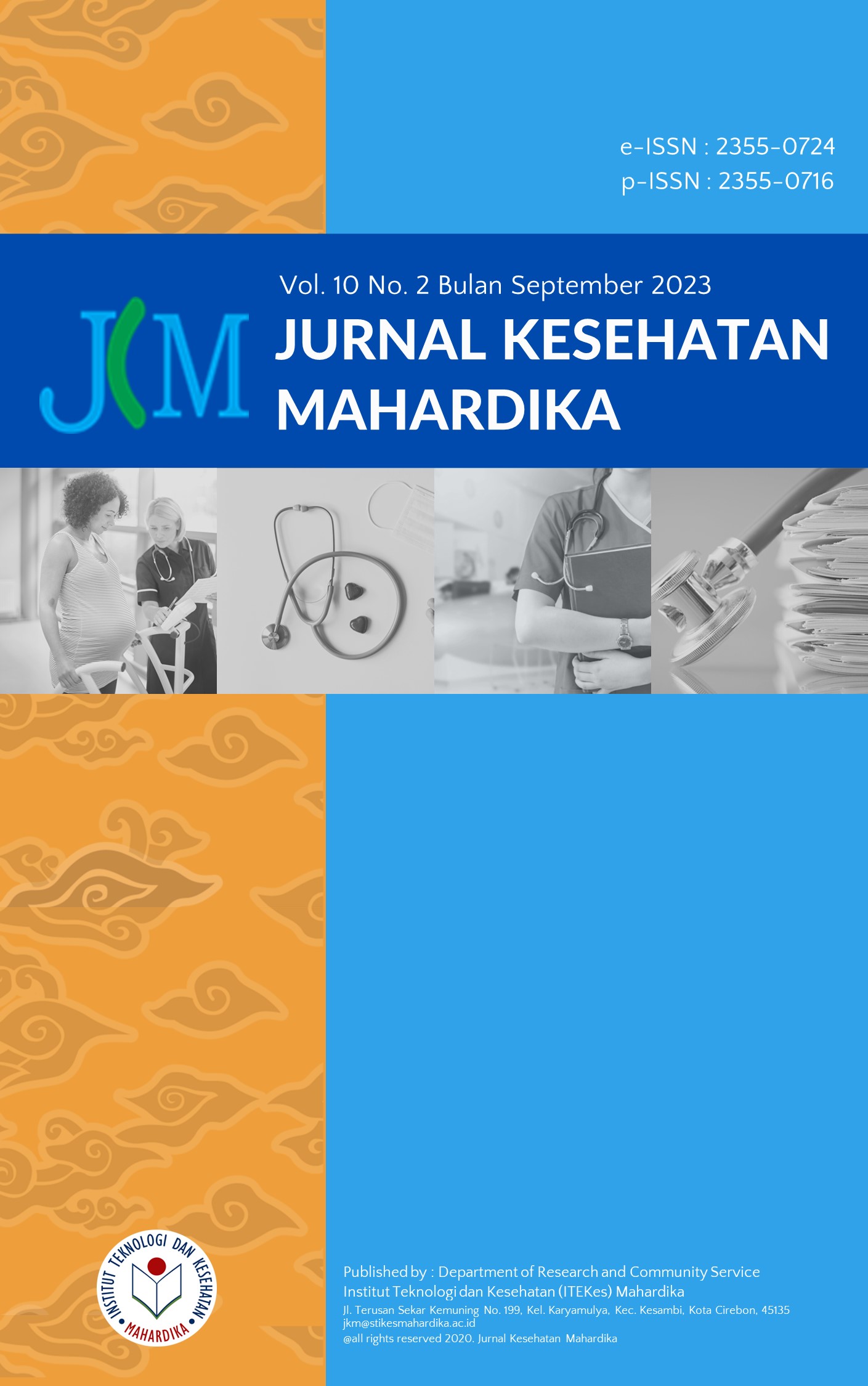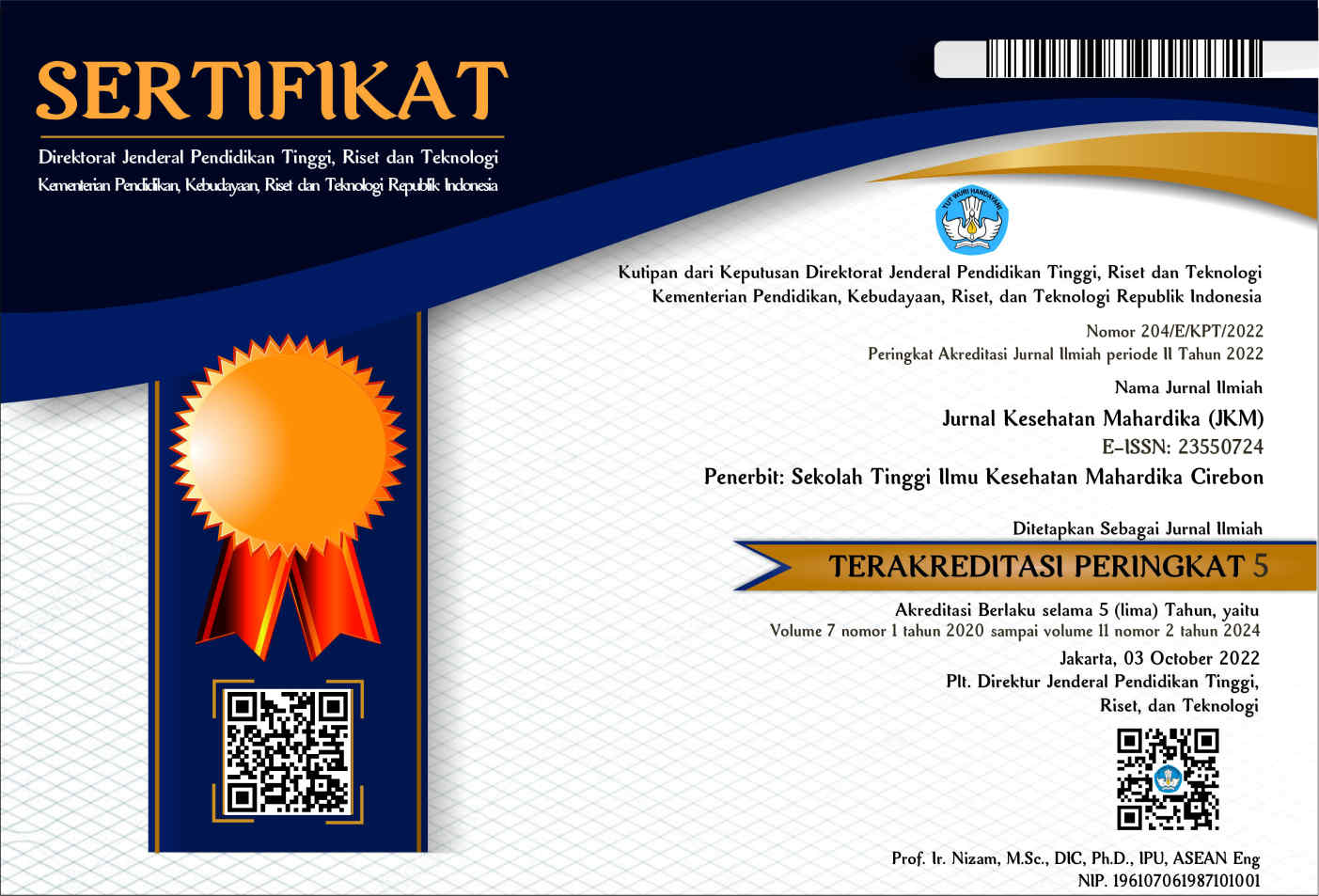Literature Study: Stunting and Children's Motor Development Problems
Keywords:
Stunting, Motor, DevelopmentAbstract
The Global Nutrition Report states that 22.2% of children worldwide are stunted. Stunting is a public health problem associated with an increased risk of pain, death and inhibition to growth both motor and mental. Lack of nutrient intake can directly affect the development of muscles, brain and nerves as the main factor of child development. The purpose of this study was to determine the relationship between stunting and children's motor development. The method used in writing this article is literature review through google scholar-based data. The results of the study showed that stunting has a significant relationship with children's motor development abilities, both gross motor and fine motor. Children's nutritional intake at 1000 HPK is very important to support the child's motor growth and development.
References
Afrida, B. R., & Aryani, N. P. 2022. Hubungan Stunting terhadap Perkembangan Motorik Balita. Jurnal Ilmiah Universitas Batanghari Jambi, 22(1), 459-463.
Arini, D., Mayasari, A. C., & Rustam, M. Z. A. 2019. Gangguan Perkembangan Motorik Dan Kognitif pada Anak Toodler yang Mengalami Stunting di Wilayah Pesisir Surabaya. Journal of health science and prevention, 3(2), 122-128.
Auliana, D., Susilowati, E., & Susiloningtyas, I. 2020. Hubungan Stunting dengan Perkembangan Motorik Anak Usia 2-3 Tahun di Desa Temuroso Wilayah Puskesmas Guntur 1 Kabupaten Demak, Link, 16(1), 49-53
Djauhari, T.2017. Gizi dan 1000 HPK. Saintika Medika, 13(2), 125-133.
Fanzo, J., Hawkes, C., Udomkesmalee, E., Afshin, A., Allemandi, L., Assery, O., ... & Schofield, D. 2019. 2018 Global Nutrition Report.
Frongillo, E. A., Leroy, J. L., & Lapping, K.2019. Appropriate use of linear growth measures to assess impact of interventions on child development and catch-up growth. Advances in Nutrition, 10(3), 372-379.
Galasso, E., Wagstaff, A., Naudeau, S., & Shekar, M. 2017. The economic costs of stunting and how to reduce them. World Bank Policy Research Note. PRN/17/05, March.
Hanani, R., & Syauqy, A.2016. Perbedaan perkembangan motorik kasar, motorik halus, bahasa, dan personal sosial pada anak stunting dan non stunting. Journal of Nutrition College, 5(4), 412-418.
Jensen, S. K., Berens, A. E., & Nelson 3rd, C. A. 2017. Effects of poverty on interacting biological systems underlying child development. The Lancet Child & Adolescent Health, 1(3), 225-239.
Pantaleon, M. G., Hadi, H., & Gamayanti, I. L. 2016. Stunting berhubungan dengan perkembangan motorik anak di Kecamatan Sedayu, Bantul, Yogyakarta. Jurnal Gizi dan Dietetik Indonesia (Indonesian Journal of Nutrition and Dietetics), 3(1), 10-21.
Permatasari, D. F., & Sumarmi, S. 2018. Differences of born body length, history of infectious diseases, and development between stunting and non-stunting toddlers. Jurnal Berkala Epidemiologi, 6(2), 182-191.
Probosiwi, H., Huriyati, E., Ismail, D., & Ismail, D. Stunting dan perkembangan anak usia 12-60 bulan di Kalasan. Ber Kedokt Masy [Internet]. 2017; 33 (11): 559.
Simamora, V., Santoso, S., & Setiyawati, N.2019. Stunting and development of behavior. International Journal of Public Health Science, 8(4), 427-431.
Utami, W. P., Najahah, I., Sulianti, A., & Faiqah, S. 2021. Kejadian Stunting terhadap Perkembangan Anak Usia 24–59 Bulan. Bima Nursing Journal, 3(1), 66-74.
Wulandari, E. C., Wijayanti, H. S., Widyastuti, N., Panunggal, B., Ayustaningwarno, F., & Syauqy, A. 2021. Hubungan Stunting Dengan Keterlambatan Perkembangan Pada Anak Usia 6-24 Bulan. Journal of Nutrition College, 10(4), 304-312.
Yulianti, S. 2020. Stunting Dan Perkembangan Motorik Balita Di Wilayah Kerja Puskesmas Kemumu Kabupaten Bengkulu Utara. Journal of Nutrition College, 9(1), 1-5.
Zakiyya, A., Widyaningsih, T., Sulistyawati, R., & Pan gestu, J. F.2021. Analisis Kejadian Stunting Terhadap Perkembangan Anak Usia 6-24 Bulan. Jurnal Sains Kebidanan, 3(1), 6-16.

Published
How to Cite
Issue
Section
Copyright (c) 2023 Jurnal Kesehatan Mahardika

This work is licensed under a Creative Commons Attribution-NoDerivatives 4.0 International License.












